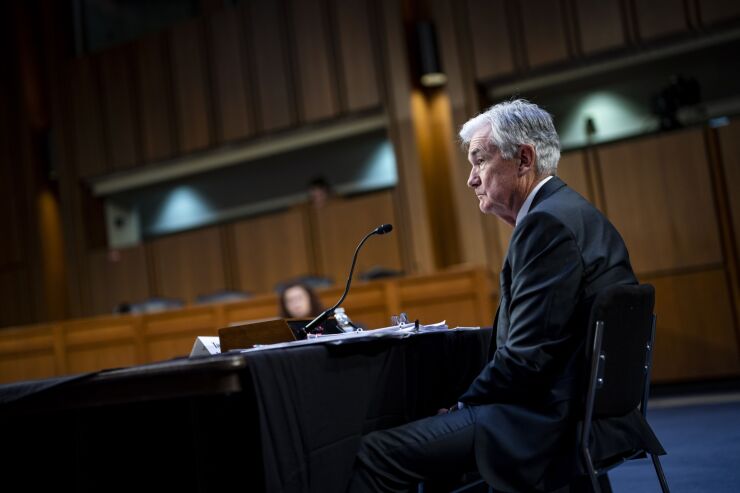Chair Jerome Powell said the Federal Reserve is likely to lift interest rates higher and potentially faster than previously anticipated with inflation persisting, an unexpectedly aggressive posture following last month's step down in the pace of hikes.
The remarks, coming in testimony before Congress on Tuesday, opened the door to officials lifting the Fed's benchmark lending rate by a half percentage point at the next meeting if upcoming reports on jobs and prices show rate hikes have done little to cool the economy.

"The latest economic data have come in stronger than expected, which suggests that the ultimate level of interest rates is likely to be higher than previously anticipated," Powell told the Senate Banking Committee. "If the totality of the data were to indicate that faster tightening is warranted, we would be prepared to increase the pace of rate hikes."
Near-term bond yields jumped, stocks fell and the dollar extended gains. Traders bet the Fed is likely to raise rates by a half point at the next meeting later this month, instead of continuing the quarter-point pace from the prior gathering. They now see rates peaking close to 5.6% this year, up from about 5.5% yesterday.
Fed officials are trying to cool inflation without triggering a recession that drives up unemployment.
"Although inflation has been moderating in recent months, the process of getting inflation back down to 2% has a long way to go and is likely to be bumpy," Powell said. Inflation remains well above the Fed's longer-run objective, he added.
The Fed began an aggressive campaign to raise its federal-funds rate a year ago, moving to a range now of 4.5% to 4.75%. Even so, the U.S. economy has shown remarkable resilience. Payrolls increased by more than 1 million in the three months through January, and recent consumption and inflation data point to persistent price pressures.
"We do have two or three more very important data releases to analyze before the time of the FOMC meeting," he told lawmakers, referring to the Federal Open Market Committee. "Those are going to be very important in the assessment we have of this relatively recent data."
Two hearings
Powell headed to Capitol Hill Tuesday for the first of two days of semiannual monetary policy testimony, his first appearance before Congress since June. He is set to testify before the House Financial Services Committee on Wednesday.
Senate Democrats are wary of the rapid rise in interest rates, while Republicans blame President Joe Biden for over-stimulating the economy and have urged Powell to keep up the inflation fight.
Democrat Elizabeth Warren warned that further rate hikes will lead to millions of job losses, according to the Fed's own projections, but may do little to quell inflation that is driven by other factors, such as supply constraints. "Chair Powell, you are gambling with people's lives," she said.
The Fed leader is facing lawmakers who are already counting down to the 2024 presidential election, the outcome of which could hinge on Powell's ability to steer inflation back toward the Fed's 2% target without causing a significant downturn.
US central bankers say they need to keep pushing interest rates higher to slow price increases. In December, officials estimated rates would peak at 5.1% this year, according to their median forecast, but several have said that a series of strong economic reports could mean rates need to move even higher.
Powell made clear Tuesday those forecasts will likely climb when officials submit new projections this month, and said the Fed would be prepared to return to a bigger rate hike at their next meeting if the data warrant. Officials raised rates by 25 basis points at their Jan. 31-Feb. 1 meeting, following a half-point hike in December and after four 75-basis-point increases last year.
Following Powell's remarks, some economists upped their expectations for how aggressively the Fed will move when it meets in two weeks and for how high rates will need to go to cool prices.
"Powell's comments make it sound as though they need to be convinced not to speed the pace up," economists for LH Meyer/Monetary Policy Analytics wrote in an emailed note Tuesday morning. "The presumption that's been established is that they will hike 50 in March, unless they are convinced otherwise."
Inflation pressures
While inflation has eased since the last time Powell testified before Congress, it is still well above the Fed's. The personal consumption expenditures index, the Fed's preferred price gauge, rose 5.4% for the 12 months through January.
"The breadth of the reversal along with revisions to the previous quarter suggests that inflationary pressures are running higher than expected at the time of our previous Federal Open Market Committee meeting," Powell said.
The labor market, which Powell for months has said is extremely tight and out of balance, has yet to buckle under higher borrowing costs. The unemployment rate dipped to 3.4% in January, the lowest in more than five decades, while Black unemployment fell to 5.4%, just above a record low.
"Despite the slowdown in growth, the labor market remains extremely tight," Powell said.
--With assistance from Jonnelle Marte, Steven T. Dennis and Steve Matthews.




